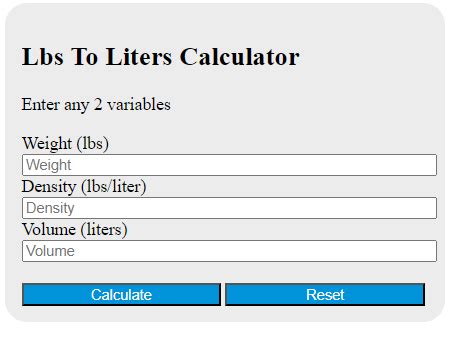How Much Is 10 Liters In Pounds
Webtuts
Apr 07, 2025 · 4 min read

Table of Contents
How Much is 10 Litres in Pounds? A Comprehensive Guide to Volume and Weight Conversions
Converting between litres (a unit of volume) and pounds (a unit of weight or mass) isn't a straightforward calculation. It's not a simple conversion like converting inches to centimeters. The reason? The weight depends entirely on the density of the substance being measured. A litre of water weighs significantly less than a litre of mercury, for instance. This article will delve into the complexities of this conversion, providing you with the tools and knowledge to accurately determine the weight of 10 litres of various common substances.
Understanding the Relationship Between Volume and Weight
Before we jump into the specifics of calculating the weight of 10 litres in pounds, let's establish a clear understanding of the core concepts:
-
Volume: This refers to the amount of three-dimensional space occupied by a substance. Litres (L) are a common unit of volume in the metric system.
-
Weight (or Mass): This refers to the amount of matter contained within a substance. Pounds (lbs) are a unit of weight in the imperial system. The terms "weight" and "mass" are often used interchangeably in everyday conversation, but technically, mass is the amount of matter, while weight is the force of gravity acting on that mass.
-
Density: This is the crucial link between volume and weight. Density is defined as the mass per unit volume of a substance. It's typically expressed in grams per cubic centimeter (g/cm³) or kilograms per litre (kg/L). The formula for density is:
Density = Mass / Volume
Therefore, to find the mass (and thus, the weight), we need to know both the volume and the density of the substance.
Calculating the Weight of 10 Litres: A Step-by-Step Approach
To calculate the weight of 10 litres of a substance in pounds, follow these steps:
-
Identify the Substance: First, you need to know what substance you're dealing with. Different substances have vastly different densities.
-
Find the Density: Look up the density of the substance in question. You can usually find this information online through scientific databases or reference books. Make sure the density is expressed in a compatible unit (e.g., kg/L).
-
Convert Density (if necessary): If the density is given in a different unit (like g/cm³), you'll need to convert it to kg/L. Remember that 1 kg = 1000 g and 1 L = 1000 cm³.
-
Calculate the Mass: Use the density formula to calculate the mass of 10 litres:
Mass (kg) = Density (kg/L) * Volume (L)
In this case, the volume is 10 litres.
-
Convert Kilograms to Pounds: Finally, convert the mass from kilograms to pounds using the conversion factor: 1 kg ≈ 2.205 lbs.
Mass (lbs) = Mass (kg) * 2.205
Examples: Calculating the Weight of 10 Litres of Common Substances
Let's illustrate this process with a few examples:
Example 1: Water
The density of water is approximately 1 kg/L. Therefore:
- Density: 1 kg/L
- Mass (kg): 1 kg/L * 10 L = 10 kg
- Mass (lbs): 10 kg * 2.205 lbs/kg ≈ 22.05 lbs
Therefore, 10 litres of water weighs approximately 22.05 pounds.
Example 2: Gasoline
The density of gasoline varies slightly depending on the blend, but a reasonable approximation is 0.75 kg/L. Therefore:
- Density: 0.75 kg/L
- Mass (kg): 0.75 kg/L * 10 L = 7.5 kg
- Mass (lbs): 7.5 kg * 2.205 lbs/kg ≈ 16.54 lbs
Therefore, 10 litres of gasoline weighs approximately 16.54 pounds.
Example 3: Mercury
Mercury is much denser than water. Its density is approximately 13.6 kg/L. Therefore:
- Density: 13.6 kg/L
- Mass (kg): 13.6 kg/L * 10 L = 136 kg
- Mass (lbs): 136 kg * 2.205 lbs/kg ≈ 299.98 lbs
Therefore, 10 litres of mercury weighs approximately 300 pounds.
Factors Affecting Accuracy
It's crucial to remember that these calculations are approximations. Several factors can affect the accuracy of the weight calculation:
-
Temperature: The density of most substances varies with temperature. Warmer liquids generally have lower densities.
-
Pressure: Pressure also affects density, although the effect is usually less significant than temperature for liquids.
-
Composition: The exact composition of a substance can influence its density. For example, different grades of gasoline will have slightly different densities.
-
Impurities: The presence of impurities or dissolved substances can alter the density of a liquid.
Conclusion: Beyond Simple Conversions
Converting 10 litres to pounds is not a simple matter of applying a single conversion factor. The weight depends critically on the density of the substance. By following the steps outlined above and understanding the factors that can influence accuracy, you can effectively calculate the weight of 10 litres of various substances. Remember to always consult reliable sources for the accurate density of the material you are working with. This comprehensive guide provides a strong foundation for anyone needing to perform these types of volume-to-weight conversions. Accurate calculations are crucial in various fields, from chemistry and engineering to everyday tasks involving liquids and their measurement.
Latest Posts
Latest Posts
-
1 Pint Is How Many Ml
Apr 09, 2025
-
How Many More Days Until November 1st
Apr 09, 2025
-
How Many Kilos Is 200 Lbs
Apr 09, 2025
-
How Many Days Till Feb 21
Apr 09, 2025
-
How Many Pounds In 4 Tons
Apr 09, 2025
Related Post
Thank you for visiting our website which covers about How Much Is 10 Liters In Pounds . We hope the information provided has been useful to you. Feel free to contact us if you have any questions or need further assistance. See you next time and don't miss to bookmark.